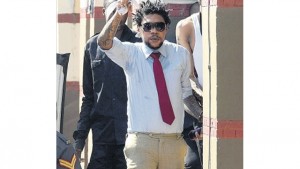 DEFENCE attorneys who are fighting to have entertainer Vybz Kartel and his co-accused convictions overturned yesterday argued that not only were the sentences excessive, but that the jury in the murder trial was not given the option of convicting the men on a lesser charge of manslaughter.
DEFENCE attorneys who are fighting to have entertainer Vybz Kartel and his co-accused convictions overturned yesterday argued that not only were the sentences excessive, but that the jury in the murder trial was not given the option of convicting the men on a lesser charge of manslaughter.
Vybz Kartel, registered Adidja Palmer, Shawn “Shawn Storm” Campbell, Kahira Jones, and Andre St John were all convicted for the August 16, 2011 beating death of Clive “Lizard” Williams.
Kartel was ordered to serve 35 years before being eligible for parole, while Campbell and Jones were ordered to each serve 25 years before becoming eligible for parole with St Johns serving 30 years before parole.
However, yesterday Jones’ attorney Robert Fletcher, during his arguments in the Court of Appeal, charged that the sentences were too excessive.
The attorney also asserted that the method used by trial judge Justice Lennon Campbell in arriving at the sentences was faulty, and that he had ignored one of the fundamental principles guiding the sentencing process.
Fletcher argued that the judge did not request a social enquiry report on the men, which would have better helped him to arrive at an appropriate sentence. According to the attorney, the appellant’s antecedent was not enough, as it would not have provided the depth of information that would have been in the social enquiry report.
Pointing to the fact that his client had no previous conviction, given the absence of the social enquiry report, he said it was not known what the trial judge thought about the prospect of rehabilitation for his client and St John.
St John’s attorney Oswest Senior Smith, who wrapped up arguments by the defence yesterday, argued that the judge, during his summation and directions, failed to properly leave the alternative charge of manslaughter to the jury.
Regarding Jones, he said the evidence was that he held Williams from behind while at the house in Havendale, where the latter was allegedly killed, while the evidence was that St John was seen standing over Williams with a block in his hand.
However, Senior Smith said that Williams was not seen with any blood or injury and was heard calling out a name, hence he was not dead.
“When did he die? When was the fatal blow struck and who struck it?” the attorney questioned, while stressing that there were gaps in the prosecution’s case as to how Williams was killed as no one witnessed his death.
Consequently, he said the judge was wrong in concluding that St John and Jones had been involved in a common design to kill Williams, as neither piece of evidence against the two meant that they had committed the killing.
Additionally, he said, if it was to be accepted as fact that his client held Williams, he could have done it to rough up the witness and, at the very most, the judge should have asked the jury to consider manslaughter.
Senior Smith, in the meantime, charged that the judge’s summation was “defective in form and substance”.
He singled out the defence given by Kartel in his unsworn statement in which he denied killing Williams or sending someone to do it, noting that the judge did not give it sufficient weight.
He said the judge instead placed emphasis on his assertion that there was a conspiracy by the police against him.
Fletcher, who had taken the floor before Senior Smith in completing his arguments, said that the supporting agencies in the case were “loose, lax and inept”, leaving the prosecution with no choice but to “roll out a case of contamination, deep and abiding contamination, that led his lordship to repeated management confusion”.
Prosecutor Jeremy Taylor will today respond to the grounds presented by the defence.
